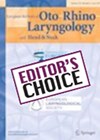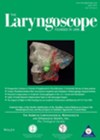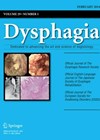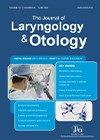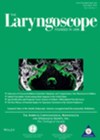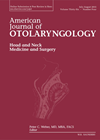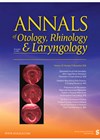
Journal Reviews
In the United States, do people with dysphagia have a higher chance of being dysphonic?
Dysphagia and dysphonia can co-occur due to their shared anatomy and physiology. Previous studies have considered this relationship and determined that certain conditions, such as cancer, laryngeal impairments or neurological disorders, may lead to problems with both swallowing and voice....
Management of post-tonsillectomy bleeding with nebulised TXA
In the last 20 years, rates of adult tonsillectomy have fallen in the order of 50%. The flipside to this, is that the number of admissions of patients with acute tonsilitis is more than double the reduction in tonsillectomy rates....
What are the airway, voice and swallowing outcomes of a mucosal-sparing surgical approach to improving the glottic airway in bilateral vocal fold immobility?
Bilateral vocal fold immobility (BVFI) causes significant breathing problems as well as voice and swallowing difficulties. Surgical interventions aim to enlarge the glottic outlet by altering or removing glottic structures which improve breathing but often lead to worsening dysphonia and...
Do easier-to-swallow tablets improve medication adherence in people with dysphagia?
Swallowing tablets can be challenging for many people, but particularly so for those with a diagnosis of dysphagia. As a result, many medications are prepared in alternate formats including liquid, dissolvable or orally disintegrating tablets that dissolve on contact with...
Wandering foreign bodies in the upper aerodigestive tract
Fish and chicken bones, along with metal wires, are among the most commonly ingested foreign bodies. Due to their linear shape and sharp edges, they can sometimes migrate beyond the lumen, making conventional endoscopic extraction unsuccessful. This issue is further...
Measuring radiation fibrosis in patients with head and neck cancer
People treated with radiotherapy for head and neck cancer experience several acute and chronic effects of this treatment, of which fibrosis is perhaps the most common. Fibrosis occurs as a wound healing response and leads to scarring and reduced range...
Sleep apnoea got your heart in your throat? Perhaps it’s time to ditch the CPAP and fetch the scalpel
The link between obstructive sleep apnoea (OSA) and cardiovascular disease (CVD) is clear. Its well-established association with essential hypertension is thought to link OSA to an increased risk of atherosclerotic and hypertensive sequelae. However, data on the long-term impact of...
Older patients hospitalised for pneumonia: what factors determine survival after discharge?
A high proportion of older adults hospitalised for pneumonia may have co-existing risk of aspiration due to dysphagia. The authors of this single-centre retrospective cohort study followed up patients over the age of 65 who were admitted to hospital with...
Does vocal tremor lead to changes in swallowing function?
Vocal tremor (VT) is a debilitating problem, but remains challenging to treat. Its pathophysiology remains indeterminate and there is a lack of consensus on phenotypes. Clinically, VT is often noted to be present in muscles outside of the larynx, including...
Adjuvant radiotherapy for T4N0 laryngeal cancers treated with laryngectomy
A total laryngectomy remains the gold standard for the initial treatment of advanced (T4) squamous cell carcinomas of the larynx without evidence of distant disease. Adjuvant radiotherapy (RT) is also recommended for such cancers. In the absence of other adverse...
Tonsillectomies are a pain in the neck!
You thought tonsilitis was bad? Having your tonsils removed, now that’s a hard pill to swallow. Very well, you’ll no longer have to fear the CENTOR, but how do we make recovery as pain-free as possible? Pantabtim and colleagues set...
Dysphagia services in the emergency department
The emergency department acts as the first port of call for many individuals with wide-ranging diagnoses and conditions, several of whom may potentially present with dysphagia. It is not a usual environment in which speech and language therapists regularly work,...


